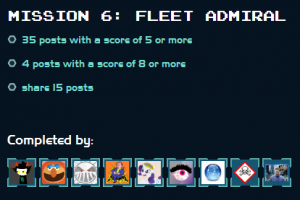A few months ago, I outlined a contest formula called “Hot Topics,” which has become a staple in CHAOS’s site-promotion efforts. For those who missed that post, Hot Topics initially worked like this:****
Pick a topic of the week, and enter everyone who asks a question related to that topic into a random drawing to win a prize. The number of entries a person gets is equal to the number of questions they ask about the topic of the week.
We now have a few variations on this contest format.****
Variations on the Hot Topic Format
- Highest-scored post - Like the name suggests, instead of raffling off prizes, we reward the question or answer that has the highest score.
- Most-viewed post - Similar to the “Highest-scored post”, in this variation we reward the post that gets the most views during the contest.
- Showdown - Showdown contests are slightly different than Hot Topic contests because they involve two topics, pitted against each other. Our first showdown contest was Skyrim versus Modern Warfare 3 - a battle to see which game got the most views and which users asked the top-voted question and answer in each category.
Skyrim vs. MW3 successfully engaged the Gaming community, but it hinged on a manufactured rivalry that didn’t make much sense. Because of that, we’re now using this form of contest when there is a pre-existing event hinged on a showdown scenario. For example, Marvel Comics’ blockbuster event for 2012 is the mini-series Avengers vs. X-Men. Just as the series pits two premier super teams in battle, the current Avengers vs. X-Men contest running on SciFi goes right along with that by pitting our Avengers questions against our X-Men questions in a battle for views.

Drawbacks of the Hot Topic Format
The Hot Topics contest and variations thereof are generally successful in engaging the community and celebrating important events, but there are some drawbacks:****
- They primarily incentivize posting. While posting questions and answers is arguably the most important component of the Stack Exchange model, there are several other actions that keep our sites running too - voting and sharing to name a couple.
- Only a few people can win, and whether you win is largely left to chance. That is, while you can promote your post by sharing it with your social networks, it’s mostly out of your control how many votes or views it gets.
- Because there are only a few winners, the competition tends to be very selfish: you can’t vote for or share other people’s posts without hurting your own chances of winning.
Our Newest Contest Format: The Mission

To rectify the shortcomings of Hot Topics, we’ve come up with a new kind of promotion: the Mission. Here’s how it works:****
The Mission promotion is pretty simple: design a series of levels, each one more difficult than the last, and give prizes to everyone who completes them.
We first tried this style of promotion to celebrate the release of Mass Effect 3 on Gaming, and it was wildly successful. We ran the contest for 3 weeks, and ended with over 900 questions tagged Mass Effect 3! Nine people completed the entire series of Missions (6 total), and over 50 completed Mission 1.
Our second contest with this format was held on Ask Different to celebrate the release of the new iPad. Instead of 6 Missions there were 3 Levels, and numbers were adjusted accordingly. Additionally, there was a voting requirement.****
Benefits and Drawbacks of Missions
There are several benefits to this type of contest in comparison to Hot Topic or Showdown contests.
- You can incentivize activities besides just asking and answering questions. You can also change the numbers and actions according to what is most appropriate for the site.
- The first Level/Mission is relatively easy to complete, and they get gradually more difficult. Therefore, users can choose the extent to which they want to be involved.
- Instead of giving prizes to a set number of people, everyone who completes a certain set of tasks wins. We do put a limit on the number of prizes we can give out per level just so we don’t go bankrupt, but we try to set the limit to be higher than the number of people predicted to complete the Mission based on average site statistics. (As those of you who completed Level 3 in the iPad contest know, we vastly underestimated you! For this we apologize and will try to do better in the future.)
- Because multiple people can win each Mission/Level, the contest tends to be less competitive. You can vote for and share other people’s posts without hurting your own chances of winning, which better preserves the way the site works naturally.
- Winning is more controllable. That is, each Mission or Level lays out a few actionable tasks, such as “ask or answer 35 posts and share 15 posts.” We do impose a minimum score requirement on some of them, but the minimum score is always achievable without having to game the system.
These benefits don’t mean that the Mission-style contest is perfect; here are some drawbacks:
- Sub-par posts are a concern in Mission-contests for a few reasons. First of all, later Missions require users to post a large number of questions and answers, and the focus on quantity may reduce the quality of the posts. Additionally, the extrinsic motivation that large prizes introduce can cause a flood of new questions, which can overburden the moderators and the community in general (see meta threads here and here for more detail).
- Asking people to share a set number of posts may cause them to exhaust their social networks, making sharing less effective in the future.
- Mission-style contests require a large time commitment to complete, and we give out a significant number of prizes. Therefore, they are only appropriate when coupled with a very important event in the community, such as the release of a highly anticipated game or product.
Clearly, choosing a contest format depends heavily on the site and the event. Any site that is receiving CHAOS attention is eligible for a contest. However, as stated above, Mission contests will probably only be run on sites that already have big events happening in their community. I’m optimistic that with these few basic contest models and the suggestions provided in meta, we can continue to improve and come up with something that fits our sites even better.